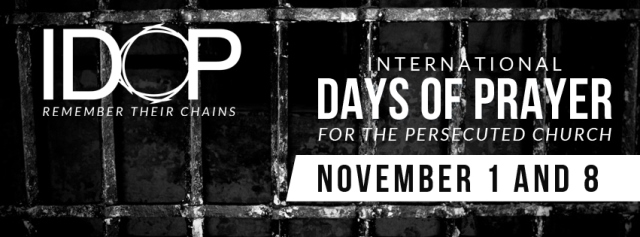Twenty Years and Counting. . .
No Christian should sleep well at night while our brothers and sisters are being martyred.
Charles Colson
My video blog today is Part 1 of a two part series on the International Day of Prayer for the Persecuted Church (IDOP). November 1 will be the 20th annual observance of IDOP (with some churches observing on November 8, instead). Here, and in the video below, I reflect on the history of IDOP, going back to the first strategy meeting, January 23, 1996.
The late IRD President Diane Knippers and I joined representatives of the World Evangelical Fellowship (now Allliance), the National Association of Evangelicals, the Southern Baptist Convention, the U.S. Catholic Conference, as well as tireless advocates like Nina Shea and Michael Horowitz, to create IDOP. We were convicted, knowing that more people had died for their Christian faith in the 20th century than in all the previous centuries combined. We also believed that not only was persecution of religious believers — particularly Christians — a shockingly overlooked human rights issue, but that Western Christians had a Biblical mandate to be a voice for their suffering brothers and sisters.
After our first meeting, a smaller team of us began to meet regularly to plan the first IDOP. IRD was IDOP’s liaison with the mainline church denominations. We didn’t want the observance to be viewed as merely an activity of the “Religious Right” or “Evangelicals.” (In 1996 the Religious Left had not yet been recast as “progressive evangelicals.”) IRD requested endorsement of IDOP from leaders in the United Methodist, Episcopal, Presbyterian Church USA, American Baptist, Evangelical Lutheran Church of America, and other denominations, as well as from organizations like the National Council of Churches.
The mainline church leaders chose not to participate. Most protested that “we should not pray just for Christians,” but should include all other people who are persecuted for any reason whatsoever. It did not seem to occur to them to create their own day of prayer for all those others, though. They preferred to dilute the prayer focus from persecuted Christians. Thousands of local mainline churches joined IDOP, nevertheless. The difference in priorities was just one more demonstration that the people in the pews and the pastors in the local churches frequently think about things far differently than the denominational leadership.
By early September 1996, churches in 110 countries had committed to participation in IDOP. Christians in nations such as Sudan, China, Pakistan, and Iran — some of the most repressive and dangerous places to be a Christian — pledged to pray for others around the world who were being persecuted! The next year, 50,000 churches worldwide participated in this special day of praying for brothers and sisters.
Now we have reached the 20th International Day of Prayer for the Persecuted Church. Persecution of Christians has not lessened…in fact, it has increased. But as the Epistle to the Hebrews declares, “we do not belong to those who shrink back and are destroyed, but to those who have faith and are saved,” and as Paul encouraged the Corinthians, “be steadfast, immovable, always abounding in the work of the Lord, because you know that your labor is not in vain in the Lord.”
Prayer for the worldwide persecuted church is the work of the Lord.
In Part 2 of the video, I will suggest some ways to make your observance of the International Day of Prayer for the Persecuted Church effective and memorable. And for those for whom praying leads to God calling you to action — some practical ways in which you can be an advocate for your brothers and sisters.
Remember that Faith on Freedom is also the title of my occasional e-newsletter for subscribers. If you are interested in issues of global Christian persecution and religious freedom, please sign up for the e-newsletter.
No comments yet




